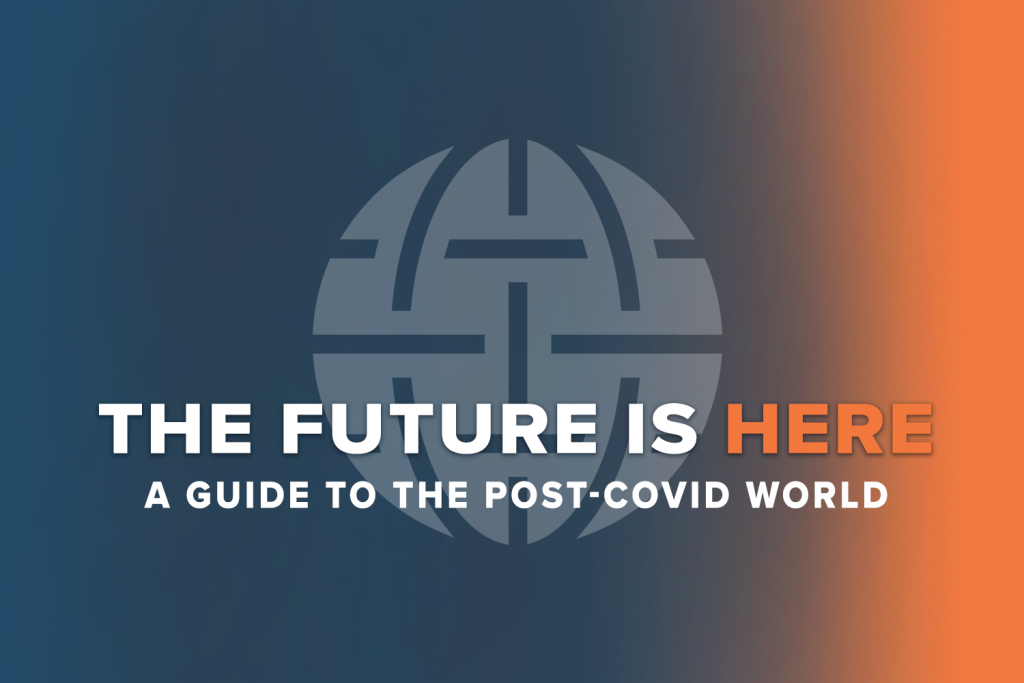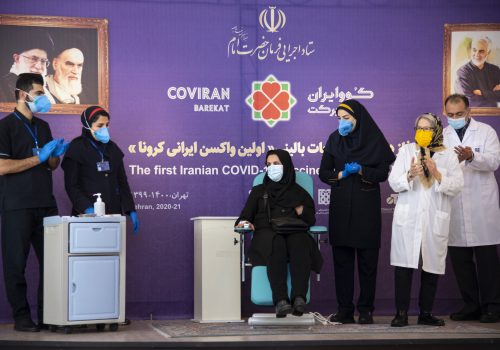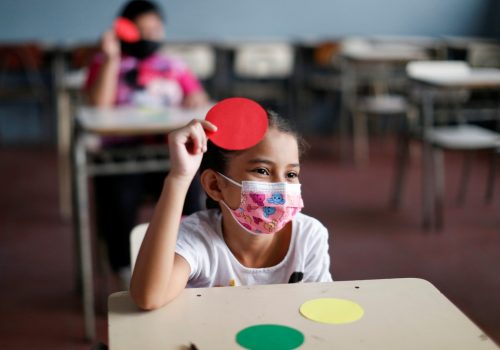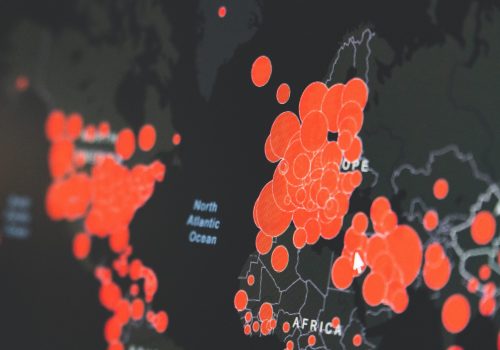The future is here: A guide to the post-COVID world 04/16/2021
Welcome to your guide to where the world is headed during the pandemic era and beyond, from Andrew Marshall. Each week, we’ll bring you the latest and most significant expert insights and international news about how coronavirus is reshaping international affairs. To stay updated each week, sign up to the newsletter here.
Let’s take a spin around the globe, in seven minutes or less.
In top stories this week:
- The pandemic has put people on edge worldwide. What does that mean for Iran as it approaches the 2021 election?
- While the US faces the prospect of a slowing vaccine rollout, Europe detects slowing COVID-19 spread.
- What happened when British pubs finally opened their doors?
- But first…
The big story
This week’s key theme: COVID-19 pushes researchers to find a new balance for speed and risk in science
What are the lessons of COVID-19 for science? Researchers are already testing out a few hypotheses.
One positive example: the incredibly rapid race to develop, test, and roll out vaccines. Speed and government money were both critical. But both may have come with some costs.
Many factors helped speed up research, including new approaches like decentralized clinical trials and trials that ran in parallel rather than in sequence, as well as new technologies like the ones that harness messenger RNA (mRNA).
“This was only possible because of decades of investment in the long arc of technology development—working out the details of a messenger RNA strategy, for instance, was a 25-year journey,” wrote Francis Collins, Director of the US National Institutes of Health (NIH). But the innovation in its use and in trials happened at lightning speed. “I can’t imagine we’ll go back to doing clinical research in the future the way we did in the past,” Collins told the Atlantic last year.
Another big lesson was the unprecedented collaboration between the government and private sector. Billions were invested, and collaboration was both deep and wide.
In the United States, a public-private partnership called Accelerating COVID-19 Therapeutic Interventions and Vaccines (ACTIV), managed by the Foundation for the NIH, received billions of dollars for trials and manufacturing from Operation Warp Speed (now rechristened simply “The Operation”). Similar projects in the United Kingdom, European Union, and elsewhere also helped drive action. COVAX, a global initiative, has guaranteed vaccine purchases for poorer countries.
The collective investment efforts didn’t just pay for early-stage research, a “push” strategy that is more common in government funding. They were also focused on later-stage research and “pull” mechanisms, whereby governments guarantee to buy output. That helped ensure not only that the research was done—but that the product came swiftly to peoples’ arms.
“Public funding shifted its focus to late-stage product development and manufacturing,” says an article in Health Affairs by Bhaven Sampat and Kenneth Shadlen. “Procurement agreements with governments replaced traditional pull incentives from patents for the major private companies.” Usually, the incentive for production is that a company does the research and then owns the patent, so it can make money from the research.
But there are negative lessons, too. The discovery of clotting issues may now lead to some rethinking of fast processes. “Despite the widespread adoption of accelerated development processes, there have been no technical or procedural breakthroughs in assessing short- or long-term safety,” says an article in Health Affairs by David E. Bloom of the Harvard T. H. Chan School of Public Health and other experts. “Potential political pressure to rush the development and regulation process beyond what can be accomplished safely may pose additional risk.” It’s not that corners have been cut, but the balance between speed and risk is tough.
Government investment and involvement has also led to problems. It is not clear if all of the investments have been very effective or cost-effective, because many of them are not very transparent. And governments have clashed over vaccine output and distribution. “There has been a lack of serious global coordination,” say Sampat and Shadlen. “This may have had consequences for the speed of innovation and the types of vaccines and therapeutics we invested in, and it may also affect access to them throughout the world.”
Are there lessons here for other global threats, like climate change? “Imagine what science and society could achieve in one year if, similar to COVID-19, nearly the entire scientific enterprise shifted to focus on climate solutions,” writes Cathryn Tonne, a researcher on health issues, in the journal Environmental Research. But the COVID-19 experience also shows the risks when countries are competing for security and scarce resources, and the rules for cooperation break down.
Subscribe to The future is here: A guide to the post-COVID world
Sign up for a weekly roundup of top expert insights and international news about how coronavirus is reshaping international affairs.

The world in brief
Insights from across the planet, in ten bullets or fewer
- J&J vaccine problems slow rollout. The United States has put a “pause” on use of the single-dose Johnson & Johnson COVID-19 vaccine as it investigates reports of blood clots in six women, resulting in one death. Regulators globally have followed the vaccine guidance from the US Centers for Disease Control (CDC) and Prevention and the US Food and Drug Administration. Plus, the government’s recommendation to pause the vaccine may be here to stay, at least for a while: The US Advisory Committee on Immunization Practices said it needed more information about the risk of side effects before it can determine whether the vaccine should be continued. The pause has caused concern that there may be delays with vaccination campaign rollouts and an increase in vaccine hesitancy.
- Is COVID-19 slowing down in Europe? Europe has suffered more than one million deaths from COVID-19 and the situation remains “serious,” a WHO official said. Hans Kluge, the WHO regional director for the continent, said Europe must keep up its guard but pointed to “early signs that transmission may be slowing across several countries” in Europe and said there was “declining incidence” among the oldest people.
- A small group gets COVID-19 despite vaccine. The CDC has identified about 5,800 cases of people who had been vaccinated against COVID-19 but got infected afterward. “To date, no unexpected patterns have been identified in case demographics or vaccine characteristics,” the CDC said. “These so-called breakthrough cases, which are defined as positive COVID-19 test results received at least two weeks after patients receive their final vaccine dose, represent 0.008% of the fully vaccinated population,” said the Wall Street Journal.
- Are patents a benefit or a problem? The United States should take “urgent action” to suspend intellectual property rights for COVID-19 vaccines, according to a letter from 175 former world leaders and Nobel laureates, written to US President Joe Biden. This would allow developing countries to create their own copies of vaccines without being sued over patents. “A [World Trade Organization] waiver is a vital and necessary step to bringing an end to this pandemic. It must be combined with ensuring vaccine know-how and technology is shared openly,” said the signatories, quoted in the Financial Times. Pharmaceutical companies and many governments oppose the measure, which has support from developing countries who fear being left behind in the vaccine rollout.
- India suffers a surge. COVID-19 infections in India hit a new daily record on Thursday, with a wave centered in the western state of Maharashtra. India has become one of the world’s worst-hit countries with more than 13.5 million confirmed cases, overtaking Brazil as the world’s second-worst hit country, behind the United States. “This spells trouble for many countries relying on Indian-made vaccines supplied through the World Health Organization’s COVAX initiative,” warns the journal Nature.
- British sink post-coronavirus pints. The United Kingdom eased its lockdown, and many Brits went straight back to the pub. Pubs and restaurants in England that opened sold twice as many drinks as they did before the pandemic, according to the CGA Drinks Recovery Tracker. Sales at 1,687 licensed premises were 58.6 percent higher than they were for the equivalent day in 2019. The majority of pubs remain closed because they do not have outdoor space, while many have permanently shut their doors.
The inside scoop
Insights from the Atlantic Council
Andrew Marshall is the Vice President of Communications for the Atlantic Council. He leads the Council’s media, digital, and editorial efforts, and coordinates the way the Council talks with its key communities.



